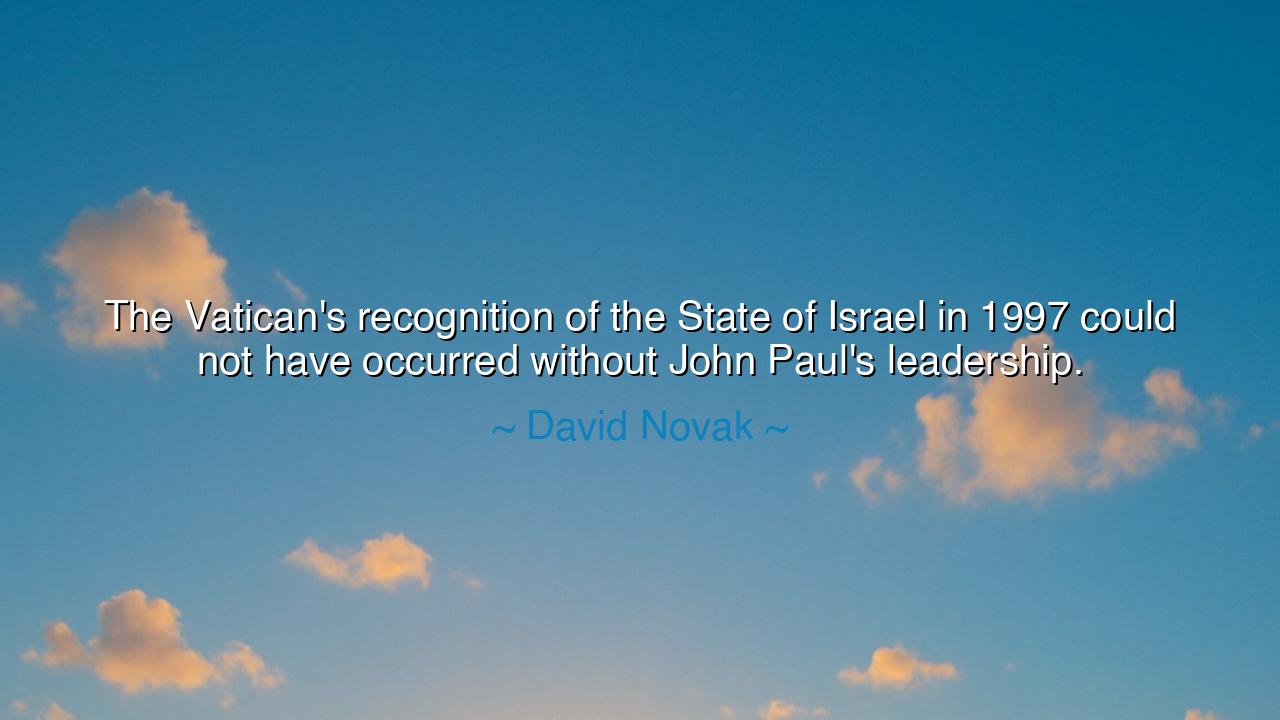
The Vatican's recognition of the State of Israel in 1997 could
The Vatican's recognition of the State of Israel in 1997 could not have occurred without John Paul's leadership.






“The Vatican’s recognition of the State of Israel in 1997 could not have occurred without John Paul’s leadership.” — David Novak
In the grand chronicle of humanity, there are moments when centuries of division, misunderstanding, and pain are at last bridged by a single act of courage. The words of David Novak remind us of such a moment — the Vatican’s recognition of the State of Israel, an event that rippled far beyond politics and diplomacy, touching the deepest roots of faith and history. For nearly two millennia, the Catholic Church and the Jewish people had walked a path shadowed by tension, mistrust, and tragedy. Yet in the twilight of the twentieth century, through the leadership of Pope John Paul II, a wound began to heal. This was not merely a political act; it was a spiritual one — a turning of hearts, a reconciliation between two ancient covenants.
To understand Novak’s words is to see the weight of history behind them. For centuries, the Church had hesitated to recognize Israel, not from malice alone, but from theological and political complexities that stretched back to the earliest days of Christendom. The Jews had been seen, wrongly, as a people cast adrift by God, their suffering interpreted through distorted lenses of prophecy and punishment. When the modern State of Israel was born in 1948, its existence challenged ancient assumptions. Yet still, the Vatican waited — nearly half a century — before extending formal recognition. That hesitation ended in 1997, and, as Novak declares, it was the moral and spiritual courage of John Paul II that made it possible.
John Paul II was a man who had seen the depths of humanity’s cruelty and the heights of its redemption. Born in Poland, a land steeped in both Catholic devotion and Jewish tragedy, he witnessed firsthand the horrors of the Holocaust. As a young man, he saw his Jewish friends taken and murdered, and he carried their memory like a sacred flame throughout his life. From those ashes grew his conviction: that hatred between faiths was a sin against God, and that reconciliation was not optional but essential. When he ascended to the papacy in 1978, he brought with him a vision that would reshape not only the Church, but the world’s moral landscape.
In 1986, Pope John Paul II did what no pontiff before him had dared: he entered a synagogue, the Great Synagogue of Rome, and prayed alongside the Chief Rabbi. His words that day were thunder and balm: “You are our elder brothers.” With those few words, he broke a chain of separation that had bound the faithful for ages. It was the beginning of a new covenant between Christians and Jews — not of doctrine, but of understanding. From there, the path toward mutual recognition was no longer blocked by fear but lit by the steady flame of his compassion and resolve.
By 1997, when the Vatican formally recognized Israel, it was not a mere diplomatic act. It was the culmination of a journey — a confession, a reconciliation, and a triumph of conscience. As Novak writes, this transformation “could not have occurred without John Paul’s leadership.” For it was he who dared to look backward without bitterness and forward without fear. He knew that faith must not build walls, but bridges; that the God who made mankind in His image cannot rejoice when His children scorn one another. His leadership was not that of command, but of example — the quiet power of humility guided by truth.
In this, John Paul II embodied the ancient principle that true leadership is moral, not mechanical. It is not measured in laws passed or treaties signed, but in hearts turned toward reconciliation. His work reminds us that even in the cold realm of politics, the spirit can move, shaping destinies where reason alone cannot. Like the prophets of old, he was a bridge between heaven and earth, between faith and action. His recognition of Israel was, at its core, an act of repentance — and through repentance, renewal.
So, let the lesson of this moment be written in our hearts: reconciliation requires courage, and courage begins with humility. The healing of nations begins in the heart of one person willing to forgive, to understand, to lead. Whether in faith, family, or community, we are all called to build bridges across our divisions. The world changes not through anger or pride, but through compassion rooted in truth.
Therefore, remember the example of John Paul II: that leadership without love is hollow, and faith without reconciliation is blind. Let us, too, seek to be instruments of peace in our own spheres — to recognize in one another the divine spark that unites us beyond creed or nation. For in the end, the highest act of knowledge is not to comprehend God, but to live His mercy. And in that mercy, as John Paul taught the world, all estrangement ends — and humanity becomes whole once more.






AAdministratorAdministrator
Welcome, honored guests. Please leave a comment, we will respond soon